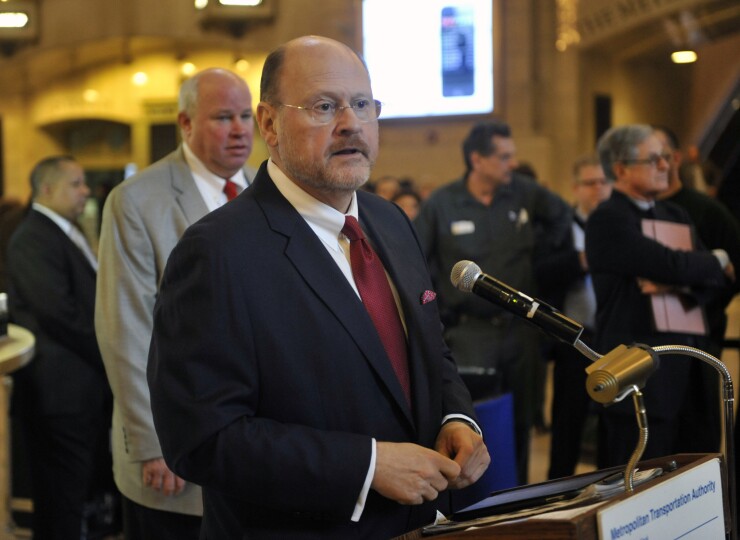New York City officials are unhappy with a provision in Gov. Andrew Cuomo’s fiscal 2019 executive budget that would enable the Metropolitan Transportation Authority to create tax increment financing districts in the city to raise revenue for operational and capital improvements.
The so-called value capture initiative has raised red flags about local autonomy and the monitoring of transportation expenses. The idea is to capture increased property tax revenue from rising assessments, which presumably are driven by improved transit near the property.
The controversy even prompted

The MTA is one of the largest municipal issuers with roughly $37 billion in debt.
Most states use some form of TIF, which originated in the 1950s.
Tax-increment financing has funded parts of the MTA’s capital program, notably the borrowing by the Hudson Yards Development Corp. to backstop the mostly city-funded $2.4 billion expansion of the No. 7 subway line west of Times Square. The city guaranteed the interest on the bonds.
In addition, Mayor Bill de Blasio has floated TIF as a means to pay for the construction of a north-south streetcar line from Queens to Brooklyn. The project, though, is iffy and critics question just how much the city can capture through development along those parts of the outer boroughs.
“As evidenced by the successful financing of Hudson Yards], TIF can play a role in financing parts of the MTA’s capital program,” said
“The proposal in the executive budget, however, does not advance that goal in a responsible manner.”
Statewide, lawmakers worry about vesting authority over a municipality’s tax revenue with an unelected regional board.
“I find it to be troubling,” said Senate Finance Committee Chairwoman Catharine Young, R-Olean, whose district sits in New York State’s Southern Tier. She also suggested the move might violate home-rule provisions.
“New York is a home-rule state,” she told Lhota in Albany.
Beyond concerns over local autonomy, the proposal also fails to conform to other best practices of value capture, said Campion. According to Campion, transportation improvement subdistricts generally sunset, after which incremental revenue reverts to a city’s general fund.
“By contrast, the MTA’s subdistricts would never expire, and the MTA would continue to collect revenue from property owners long after the authority has recovered its investment,” said Campion.
In addition, he said, the incremental revenue is not dedicated to repay the costs of the projects that created the value; the districts can be used to tax current property owners for past MTA projects; the bar for identifying capital projects is too low, risking the use of funds unrelated to value capture; and the subdistricts of up to one mile are double what the Center for Transit-Oriented Development recommends for transit zones.

“For these reasons, the state and the MTA should use the powers granted to them under the existing TIF law to partner with New York City when considering the use of value capture for future projects,” said Campion.
In a Jan. 23 conference call with reporters, First Deputy Mayor Dean Fuleihan said the budget language “would both create a new capital liability – a new capital commitment liability on the part of the city for New York City transit, which is breaking a long-standing history of how the MTA is funded.
“We certainly object to the arbitrary nature of the value capture proposal, which targets in a way that’s unprecedented for local governments that targets specific projects in New York City and takes most of what they claim would be of value … without any local input by the MTA.”
City Corporation Counsel Zachary Carter said no legal obligation exists for a city capital contribution, except for $5 million the state legislation capped in 1953. “As a matter of fact, the only provision for funding since the original legislation was he authority granted by the legislature to the transit authority to raise funds through the issuance of bonds,” said Carter.
Lhota, briefed about the call after emerging from a City Hall meeting with new City Council Speaker Corey Johnson, held his own media call, which included MTA President Patrick Foye.
Lhota fired back at de Blasio, his opponent in the 2013 general election, accusing him of “mistruths” and disregard for ridership.
“Under the law, the city is required to fund the capital needs of the NYC Transit Authority,” said Lhota. “The law goes back to 1953, and was reiterated in 1981. He should read the law.”
According to Lhota, the city is fully protected through sole approval of the transit authority’s capital plan above $5 million, while the MTA manages it.





